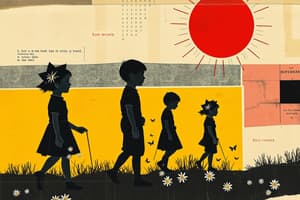Podcast
Questions and Answers
Which of the following is true about theory of mind in early childhood?
Which of the following is true about theory of mind in early childhood?
- Theory of mind develops in adulthood.
- Theory of mind develops in early childhood. (correct)
- Theory of mind develops in adolescence.
- Theory of mind develops in infancy.
What is theory of mind?
What is theory of mind?
- The ability to understand thinking processes in oneself.
- The ability to understand thinking processes in others.
- The ability to understand thinking processes in oneself and others. (correct)
- The ability to understand physical processes in oneself and others.
At what age do children begin to use words that refer to mental processes?
At what age do children begin to use words that refer to mental processes?
- Age 3
- Age 5
- Age 4
- Age 2 (correct)
According to the research mentioned, at what age do most children recognize that Maxi will believe falsely that the chocolate is in the cabinet where he left it?
According to the research mentioned, at what age do most children recognize that Maxi will believe falsely that the chocolate is in the cabinet where he left it?
In the false-belief task involving Maxi and the chocolate, what do most 3-year-old children answer when asked where Maxi will look for the chocolate when he returns?
In the false-belief task involving Maxi and the chocolate, what do most 3-year-old children answer when asked where Maxi will look for the chocolate when he returns?
According to the research mentioned, at what age does perspective-taking ability advance considerably?
According to the research mentioned, at what age does perspective-taking ability advance considerably?
Which of the following is an example of a behavior that infants exhibit to show their understanding of theory of mind?
Which of the following is an example of a behavior that infants exhibit to show their understanding of theory of mind?
At what age do children begin to recognize that others can imagine something that is not physically present?
At what age do children begin to recognize that others can imagine something that is not physically present?
What is one limitation of 3-year-olds' theory of mind?
What is one limitation of 3-year-olds' theory of mind?
Which of the following is true about false-belief tasks?
Which of the following is true about false-belief tasks?
What do most 4-year-old children recognize in the false-belief task involving Maxi and the chocolate?
What do most 4-year-old children recognize in the false-belief task involving Maxi and the chocolate?
What happens to the proportion of children who understand the false-belief task correctly as they get older?
What happens to the proportion of children who understand the false-belief task correctly as they get older?
Flashcards are hidden until you start studying
Study Notes
Theory of Mind Overview
- Theory of mind refers to the ability to attribute mental states, like beliefs and desires, to oneself and others.
- It is crucial for understanding that others can have different perspectives and knowledge.
Early Language Development
- Children begin using words related to mental processes around age 2.
False-Belief Understanding
- Around age 4, most children recognize that Maxi will incorrectly believe the chocolate is where he left it.
- In the false-belief task involving Maxi, most 3-year-olds mistakenly state that Maxi will look for the chocolate where it actually is, showing a lack of false-belief understanding.
Perspective-Taking Development
- Considerable advancement in perspective-taking ability occurs between ages 4 and 5.
Infant Behavior Reflecting Theory of Mind
- Infants demonstrate their understanding of theory of mind through behaviors like joint attention and responding to others' emotional cues.
Recognizing Imagination
- Children start recognizing that others can imagine things not physically present around age 3.
Limitations of Young Children's Theory of Mind
- A key limitation for 3-year-olds is their struggle to understand that others can hold a belief different from reality.
False-Belief Tasks
- False-belief tasks are assessments designed to evaluate how well children understand that others can have false beliefs.
- By age 4, most children accurately recognize Maxi's misunderstanding in the chocolate scenario.
- As children grow older, the proportion who understand false-belief tasks correctly increases significantly, indicating a developmental progression in theory of mind.
Studying That Suits You
Use AI to generate personalized quizzes and flashcards to suit your learning preferences.




